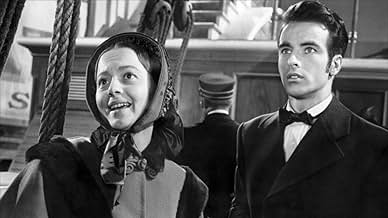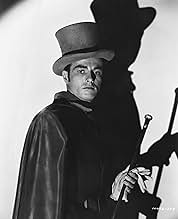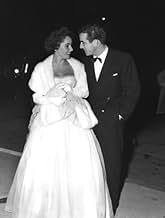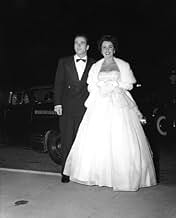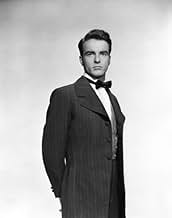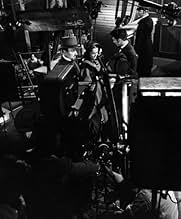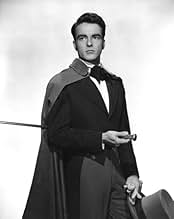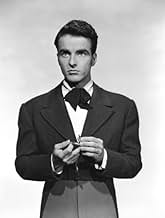A naive young woman falls for a handsome young man her emotionally abusive father suspects is only a fortune hunter.A naive young woman falls for a handsome young man her emotionally abusive father suspects is only a fortune hunter.A naive young woman falls for a handsome young man her emotionally abusive father suspects is only a fortune hunter.
- Won 4 Oscars
- 9 wins & 8 nominations total
Mary Bayless
- Party Guest
- (uncredited)
Nan Boardman
- French Maid
- (uncredited)
Jack Chefe
- French Waiter
- (uncredited)
Marcel De la Brosse
- French Porter
- (uncredited)
Ray De Ravenne
- French Waiter
- (uncredited)
Storyline
Did you know
- TriviaDirector William Wyler shot 37 takes of Olivia de Havilland carrying her suitcases up the stairs. Only after the final shoot, whereupon she briefly stopped on the second flight of stairs and leaned on the handrail for a couple of seconds, did Wyler declare that this was the take he wanted to print.
- GoofsThis story takes place at the end of the 1840s, but none of the men wear the cravats--material bound around the neck and tied in either the front or back--that were fashionable in that period; instead they wear neckties and bow ties, which did not come into fashion until the late 1850s.
- Quotes
Aunt Penniman: Can you be so cruel?
Catherine Sloper: Yes, I can be very cruel. I have been taught by masters.
Featured review
One of my favorite movies, based on one of my favorite books. Henry James sitting in the audience would have been proud of this insightful filming of his novel, "Washington Square," because the film retains so much of the subtlety of his own writing. Usually, Hollywood eliminates any of the subtlety of a great author's voice (see the recent remake of "Washington Square" if you want to see a real Hollywoodization of a novel – it actually depicts a young Catherine peeing her pants in public – an inane "Animal House"-type Hollywood requirement that degrading a woman by showing her peeing is an erotic boost for any movie). But "The Heiress" is pure James. Olivia de Havilland is perfect as James' unlikely heroine, going from an awkward gawky girl eager to please her beloved father, to a simple, loving young woman who steadfastly stands by her lover, to an embittered middle-aged woman who understands that, as Henry James says, "the great facts of her career were that Morris Townsend had trifled with her affection, and that her father had broken its spring."
If you liked this movie, read the novel. Listen to James' descriptions of Catherine and her father and see if this isn't exactly what Ralph Richardson and Olivia deHavilland portrayed:
"Doctor Sloper would have liked to be proud of his daughter; but there was nothing to be proud of in poor Catherine."
"Love demands certain things as a right; but Catherine had no sense of her rights; she had only a consciousness of immense and unexpected favors."
" 'She is so soft, so simple-minded, she would be such an easy victim! A bad husband would have remarkable facilities for making her miserable; for she would have neither the intelligence nor the resolution to get the better of him.' "
"She was conscious of no aptitude for organized resentment."
"In reality, she was the softest creature in the world."
"She had been so humble in her youth that she could now afford to have a little pride . . . Poor Catherine's dignity was not aggressive; it never sat in state; but if you pushed far enough you could find it. Her father had pushed very far."
Clifton Fadiman, in his introduction to "Washington Square," says that the novel's moral is: "to be right is not enough. Dr. Sloper is 'right'; he is right about the character of Townsend, he is right about his own character, he is right about the character of Catherine. But because he can offer only the insufficient truth of irony where the sufficient truth of love is required, he partly ruins his daughter's life, and lives out his own in spiritual poverty."
Dr. Sloper's contemptuous "rightness," penetrating and accurate as it is, is no substitute for the kindness and love his adoring daughter craves from him. In "The Rainmaker," a great Katharine Hepburn movie, also about a plain woman seeking love, only this time with a loving father, the character of Hepburn's father sums up this moral that "to be right is not enough" when he says to his self-righteous son: "Noah, you're so full of what's right that you can't see what's good!"
If you liked this movie, read the novel. Listen to James' descriptions of Catherine and her father and see if this isn't exactly what Ralph Richardson and Olivia deHavilland portrayed:
"Doctor Sloper would have liked to be proud of his daughter; but there was nothing to be proud of in poor Catherine."
"Love demands certain things as a right; but Catherine had no sense of her rights; she had only a consciousness of immense and unexpected favors."
" 'She is so soft, so simple-minded, she would be such an easy victim! A bad husband would have remarkable facilities for making her miserable; for she would have neither the intelligence nor the resolution to get the better of him.' "
"She was conscious of no aptitude for organized resentment."
"In reality, she was the softest creature in the world."
"She had been so humble in her youth that she could now afford to have a little pride . . . Poor Catherine's dignity was not aggressive; it never sat in state; but if you pushed far enough you could find it. Her father had pushed very far."
Clifton Fadiman, in his introduction to "Washington Square," says that the novel's moral is: "to be right is not enough. Dr. Sloper is 'right'; he is right about the character of Townsend, he is right about his own character, he is right about the character of Catherine. But because he can offer only the insufficient truth of irony where the sufficient truth of love is required, he partly ruins his daughter's life, and lives out his own in spiritual poverty."
Dr. Sloper's contemptuous "rightness," penetrating and accurate as it is, is no substitute for the kindness and love his adoring daughter craves from him. In "The Rainmaker," a great Katharine Hepburn movie, also about a plain woman seeking love, only this time with a loving father, the character of Hepburn's father sums up this moral that "to be right is not enough" when he says to his self-righteous son: "Noah, you're so full of what's right that you can't see what's good!"
Details
Box office
- Budget
- $2,600,000 (estimated)
- Gross worldwide
- $158
- Runtime1 hour 55 minutes
- Color
- Aspect ratio
- 1.37 : 1
Contribute to this page
Suggest an edit or add missing content



